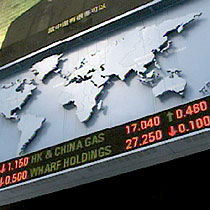2007年VOA标准英语-Ten Years Later, Asian Economies Remember, Lear(在线收听)
Hong Kong
03 July 2007
Ten years ago, an unprecedented financial crisis swept through East Asia requiring the biggest country bailouts in history. VOA's Heda Bayron in Hong Kong looks back at the turbulence that began in July of 1997 and how Asia emerged from the crisis.
 |
| Raden Pardede |
Raden Pardede remembers those days. He is the deputy president director of the Indonesian government agency responsible for selling the assets of those bankrupt companies. "That's basically one of the biggest crises in our lifetime, because after that, I think in 1998, our economy really significantly collapsed, which in terms of GDP growth we had a 13.5 percent negative growth. So the world collapsed. After that, of course, most of the conglomerates collapsed, right? That's why we had significant unemployment soon after 1998. The middle and lower income groups really suffered."
 |
But the bubble burst, first in Thailand, where companies had overloaded on foreign debt. Worried investors began selling the Thai baht and it rapidly lost value against the dollar.
Panic spread. The Indonesian rupiah, the South Korean won, the Malaysian ringgit and other currencies sank. Stock markets plunged and interest rates soared.
Governments used up foreign exchange reserves to stop the currency depreciation, lent money to cash-strapped companies and bought shares in stock markets. But the crisis continued and millions were jobless.
Indonesia and South Korea asked the International Monetary Fund to bail them out.
 |
| Park Yung-chul |
Today, not only has Asia recovered from the crisis, it has learned the lessons of 1997.
"We have reconstructed much of the South Korean economy and the exchange rate is being properly valuated rather than undervalued and we possess a lot of foreign exchange reserve, which makes it less possible for foreign speculators to confuse the market," says Yung-Chul
Raden Pardede says, if another crisis comes, Indonesia is in a much stronger position than in 1997. "We may see some crisis coming. We don't know exactly when, any trigger from one country to another country, contagion is of course inevitable in this globalization era. But I think the magnitude will not be the same as what we have in 1997."
Asian governments continue to take measures to strengthen their economies and, they hope, to prevent another crisis.